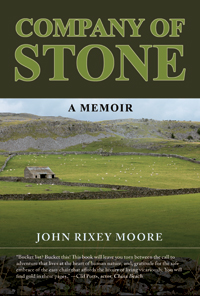Company of Stone by John Rixey Moore | Books in Review
 John Rixey Moore served in Vietnam in 1968-69 with the 5th Special Forces Group, and he was also a part of SOG. He was a Green Beret, although he rarely wore that particular headgear in Vietnam. This information was gleaned from his first memoir, Hostage of Paradox . None of this information is given in the current memoir, Company of Stone (Bettie Youngs Books, 312 pp., $19.95, paper).
John Rixey Moore served in Vietnam in 1968-69 with the 5th Special Forces Group, and he was also a part of SOG. He was a Green Beret, although he rarely wore that particular headgear in Vietnam. This information was gleaned from his first memoir, Hostage of Paradox . None of this information is given in the current memoir, Company of Stone (Bettie Youngs Books, 312 pp., $19.95, paper).
Moore begins his latest memoir by relating his adventures in the Scottish Highlands. He is on a walking tour, which seems like a bad idea for a guy who has not recovered from a serious bullet wound in his right hip from an enemy AK-47 round. The first many pages of this memoir read like a philosophical meditation on the effects of war.
To wit: “The record bullet fragment lay heavy against my bone, and the overland walk had stirred once again the hyena pain from its uneasy slumber.”
Moore sought overnight refuge from his hunger, fatigue, and pain at The Brothers Observant, a monastery. Gradually, he found a place for himself there, helping the monks build a stone wall in a field. But Moore fell and re-injured his wound, and the hyena pain in his hip bone reawakened.
Shortly after that, Moore was ejected from the monastery. An overheard conversation in a pub that mentioned Consolidated Mines in Timmons, Ontario, resulted in him, the reader, and the story going thousands of miles from Scotland to Canada. There, on the grass-covered plains of Ontario, Moore became a drill operator in another all-male environment.
The dinner he orders in the pub is never described, although there are several pages of observation of the pretty woman running the place. In short order, Moore mentions his “dream-like state” and his time in Vietnam, “seeing back through the curtain of a new reality.” He wonders about “the strong arithmetic of chance.” He later dreams of goldmines.
Part Two of this memoir, “The Troglodyte, ” begins with his first day in the gold mine. There are many mysteries in this memoir, things we are never told. There are many lines describing how a particular glass of Scotch whiskey tastes, but there’s nothing about traveling, except when Moore is walking or hitching a short ride. Moore does tell us about the “smell of wet prairie grass” when he comes up out of the mine where he learns to do a difficult, dangerous job.
John Rixey Moore
Moore brilliantly shows us the challenges and dangers of gold mining deep below the surface. He also explores the satisfactions that come to him, and perhaps even the healing effects of such work with mysterious, damaged men who do their work well, hidden behind masks and dark clothes all day, to emerge at night to eat, drink, and fight—sometimes to the death.
Much of this book functions as an extended meditation on the effects of war. When Moore was in the monastery, he noticed that some of the monks had faded Royal Navy tattoos. He had a flashback while working in the kitchen doing scullery work. When a stack of wooden bowls drops on the hard floor, they clatter like “automatic rifle fire, ” and Moore reacts by throwing himself down and low crawling for cover.
The monks figure out that he is a recent war veteran, and he has a discussion with one of them about the war. He makes friends in the monastery, but he does not belong there. This section of the book has dozens (perhaps hundreds) of references to Moore’s war and to war in general. Every bit of the monastery section of the book is fascinating. Even though this environment is a safe one for Moore, especially compared to the Ontario gold mine, his authorial gifts summon up many ominous scenes that hold a reader’s interest, especially when he is exploring nearby ruins and encountering ghosts.
His previous life as a soldier is also detected in the mine. Somehow his behavior in the mine environment enables another miner to discern that he is a war veteran, and he makes a friend there. This friend is mysterious but was likely a Nazi soldier in a previous life. He is well-characterized and becomes known to the reader for his oft-made comment, “You ain’ dead yet.”
That is the major philosophical note that Moore’s sojourn in Ontario ends on. He leaves suddenly in the middle of the day, deciding that he does not belong in the gold mine, either.
We are told that this is a “true story.” Then Moore says that characters and events are real, but that in some cases names and locations have been changed and that some events have been changed for storytelling purposes. That does not make this book a novel. Much of it does read like a novel, with lots of dialogue. At least once, Moore states that he does not remember an exact conversation, and he then presents a summary of it, rather than trying to reconstruct the words.
I loved the book, and highly recommend it to folks who want to read a memoir of what one young man did immediately after his war in Vietnam, and I look forward to the next volume in Moore’s series. The next volume will have to be very different from the first two; Moore went on to work as an actor in TV soap operas.
John Rixey Moore is totally his own man, but occasionally this work reminded me of Tom Robbins and Carlos Castaneda. Those comparisons are intended as a great compliment.
—David Willson
